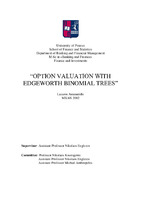Option valuation with Edgeworth Binomial Trees

Master Thesis
Author
Αμανατίδης, Λάζαρος
Amanatidis, Lazaros
Date
2022Advisor
Εγγλέζος, ΝικόλαοςEnglezos, Nikolaos
View/
Keywords
Option ; CRR Model ; Edgeworth Model ; Edgeworth Binomial Trees ; Option pricing ; Parameter estimation ; Forecasting ability ; Skewness ; Kurtosis ; Δικαιώματα ; Διωνυμικό δέντρο ; Μοντέλο Edgeworth ; Διωνυμικά Δέντρα Edgeworth ; Αποτίμηση δικαιωμάτων ; Εκτίμηση παραμέτρων ; Προβλεπτική ικανότητα ; Ασσυμετρία ; Κυρτότητα ; ΚύρτωσηAbstract
The purpose of this thesis is the Option Valuation using Edgeworth Binomial Trees. Mark Rubinstein in 1998 proposed an Edgeworth Expansion to transform a standard binomial density into a unimodal standardized discrete density, which is evaluated at equally-spaced points with prespecified skewness and kurtosis – the skewness being non-zero and the kurtosis being greater than three.
At the beginning, there is an introduction about the various option pricing models, followed by the Option Pricing theory. Furthermore, the Edgeworth Binomial Tree and its main advantages compared to the Cox-Rubenstein-Ross (CRR) Binomial Model is described, as well as the theory behind the construction of the tree and where the Edgeworth Expansion is applied.
The Empirical study is next, with the evaluation of the Edgeworth Binomial Tree compared to the CRR Binomial model, using real market option data from the Meta Platforms stock, for a period of 5 months, with 4 different maturity samples.
Finally, after the In-the-sample and Out-of-sample comparison of the models, we have the conclusion with the results of this comparison.


